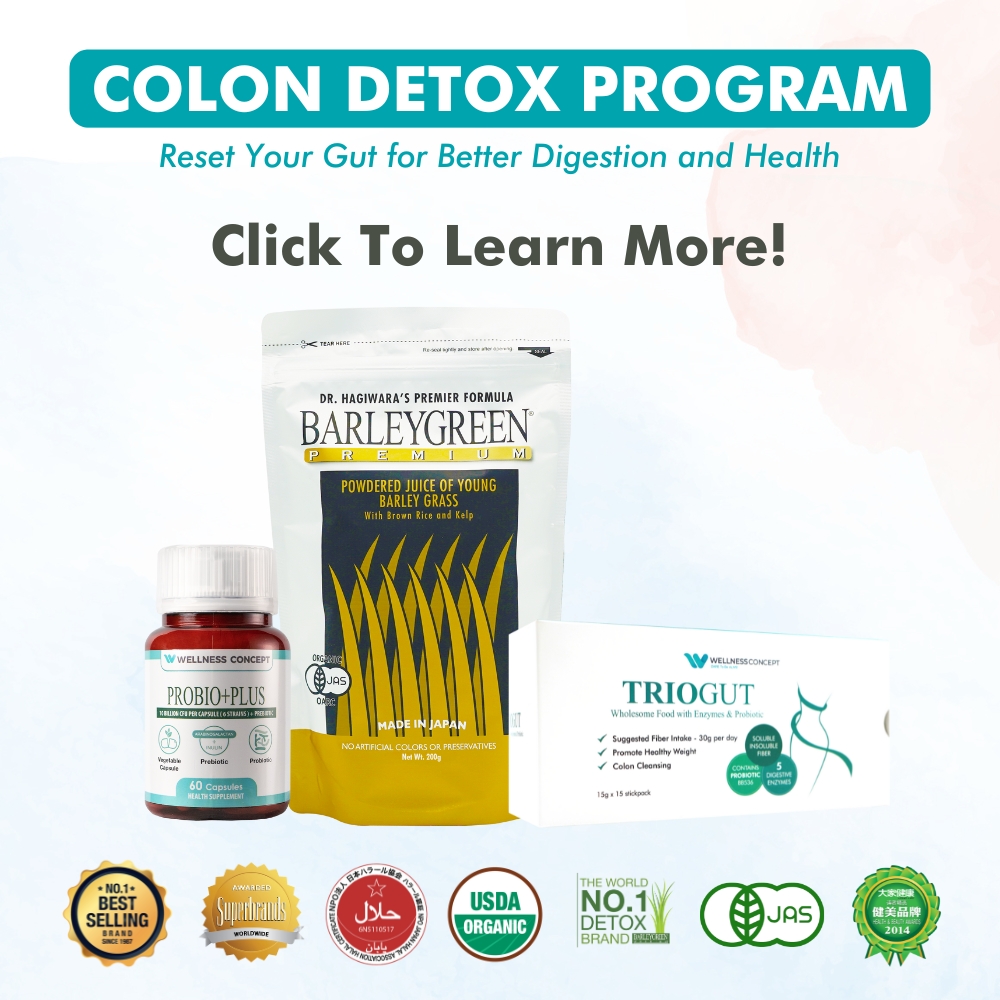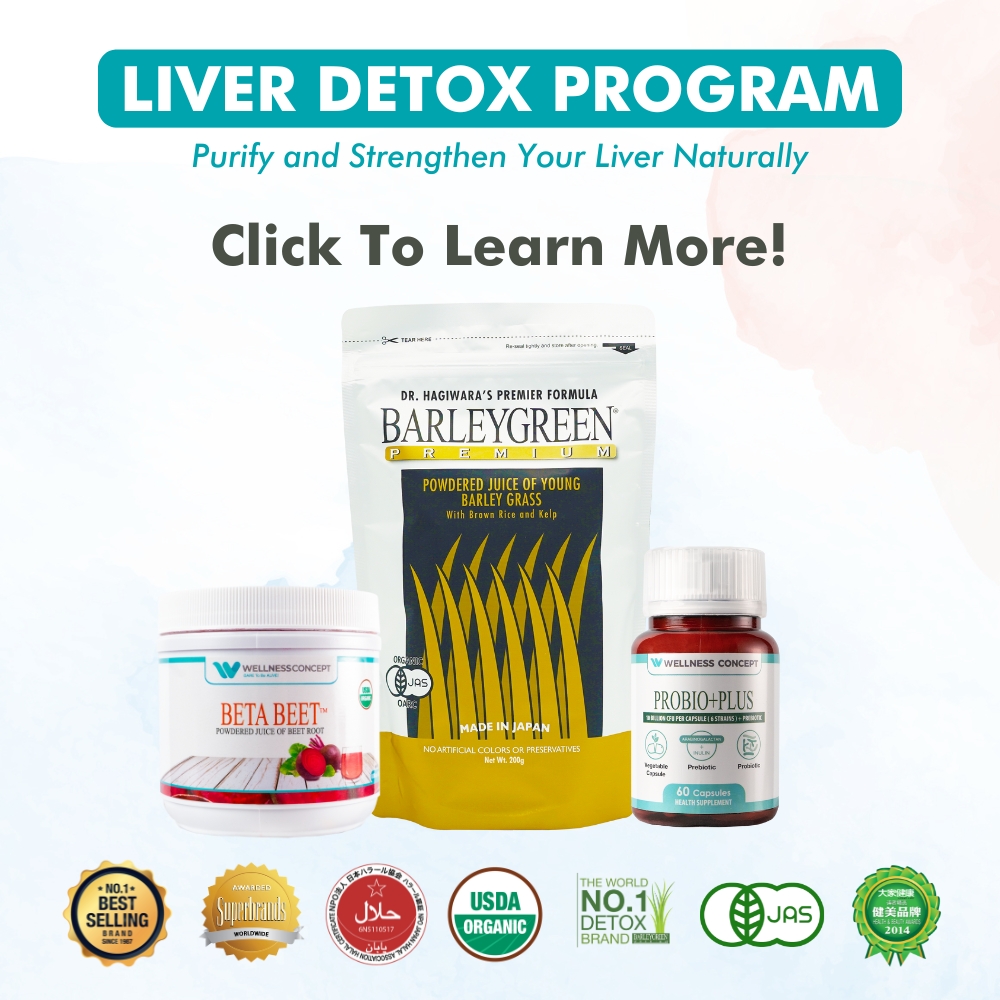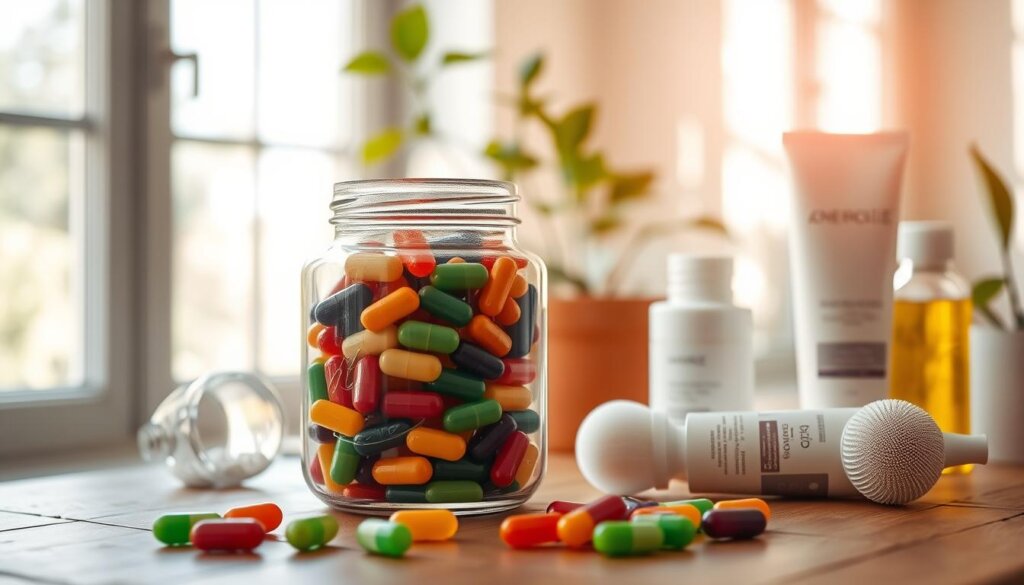Did you know that 30% of skin conditions could be linked to gut health? Research shows a strong connection between the gut and skin, often referred to as the gut-skin axis. This relationship highlights how improving gut health can lead to clearer, healthier skin.
In Malaysia, where acne affects nearly 30% of adolescents and young adults, finding effective solutions is crucial. Probiotics, often called “good bacteria,” play a significant role in balancing gut health. Studies suggest that certain strains can reduce acne lesions by up to 50%, making them a promising option for skin treatment.

Click to 了解更多
Wellness Group, a trusted name in Malaysia, offers expert guidance on using probiotics to tackle acne. Their team combines scientific evidence with practical advice to help you achieve better skin health. Whether you’re looking for oral supplements or topical solutions, they provide tailored recommendations to suit your needs.
For personalized assistance, contact Wellness Group via WhatsApp at +60123822655. Their friendly team is ready to answer your questions and guide you toward the best probiotic solutions for your skin. Visit their location in Malaysia to explore their range of products and services.
Key Takeaways
- Gut health significantly impacts skin conditions, including acne.
- Probiotics can reduce acne lesions by up to 50% in clinical trials.
- Wellness Group offers expert advice on probiotic-based skin treatment.
- Contact them via WhatsApp at +60123822655 for personalized guidance.
- Their solutions are backed by scientific evidence and practical insights.
Introduction to Probiotics and Acne
Healthy skin often starts with a healthy gut, a concept supported by research. The balance of bacteria in your body plays a significant role in maintaining overall wellness, including the appearance and function of your skin. This connection is especially important when addressing common concerns like acne.
What Are Probiotics?
Probiotics are live microorganisms that provide health benefits when consumed. They are often referred to as “good bacteria” because they help maintain a balanced gut environment. This balance is essential for supporting the immune system and promoting overall health. Studies suggest that certain strains can also influence skin health positively.
Acne: An Overview
Acne is a common skin condition that affects millions worldwide. It occurs when hair follicles become clogged with oil and dead skin cells, leading to inflammation. Factors like hormones, diet, and stress can trigger breakouts. Research shows that the gut-skin axis plays a role in acne development, highlighting the importance of internal health.
The immune system’s response to imbalances in gut bacteria can also impact skin appearance. For example, an overactive immune response may worsen inflammation, leading to more severe acne. Understanding this connection can help in finding effective solutions.
To learn more about how gut health influences overall wellness, check out this detailed guide on digestive health.
Understanding Acne: Causes and Triggers
The development of acne involves a combination of internal and external triggers. This skin condition is not just a surface issue but often a reflection of deeper imbalances. By understanding its root causes, individuals can take targeted steps toward clearer skin.
Inflammation and Sebum Production
One of the primary factors behind acne is inflammation. When hair follicles become clogged with excess oil and dead skin cells, it creates an environment where bacteria thrive. This leads to redness, swelling, and the formation of lesions.
Sebum, the oil produced by sebaceous glands, plays a key role. Overproduction of sebum can block pores, worsening acne. Hormonal changes, such as those during puberty, often trigger this excess oil production.
Hormonal and Environmental Influences
Hormonal fluctuations are a significant factor in acne development. Androgens, like testosterone, can increase sebum production, leading to breakouts. This is why many patients experience acne during puberty, pregnancy, or stress.

Click to 了解更多
Environmental factors also contribute. Pollution, humidity, and certain skincare products can clog pores or irritate the skin. Additionally, diets high in refined sugars and processed foods may exacerbate acne by increasing insulin levels.
Understanding these triggers helps in tailoring effective treatment acne strategies. By addressing both internal and external factors, individuals can achieve better skin health.
The Gut-Skin Axis and Its Impact on Acne
The gut and skin share a deep connection, often overlooked in skin health discussions. This relationship, known as the gut-skin axis, explains how imbalances in the gut microbiome can directly affect the skin microbiome. Research shows that 70% of immune cells reside in the gut, making it a key player in regulating skin health.
When the gut microbiome is disrupted, it can lead to inflammation, which often manifests on the skin. This inflammation is a common trigger for conditions like acne. Studies suggest that a healthy gut helps maintain a balanced skin microbiome, reducing the likelihood of breakouts.
The immune system plays a crucial role in this process. A well-functioning gut supports the immune system, which in turn helps regulate skin health. Conversely, gut dysbiosis can weaken the immune response, leading to increased inflammation and acne severity.
Clinical insights reveal that restoring gut balance can improve skin conditions. For example, certain strains of beneficial bacteria have been shown to reduce acne symptoms by calming inflammation and supporting the skin microbiome. This highlights the importance of addressing gut health for clearer skin.
Both oral and topical approaches can help maintain this balance. Oral supplements target the gut microbiome, while topical solutions directly support the skin microbiome. Together, they offer a comprehensive strategy for managing acne and promoting overall skin health.
How Probiotics Work to Improve Skin Health
The science behind clearer skin often lies in the balance of beneficial bacteria. These microorganisms, known as probiotics, play a dual role in promoting health. They not only target harmful bacteria but also reduce inflammation, making them a powerful tool for skin care.
Antimicrobial and Anti-inflammatory Actions
Probiotics work by targeting harmful bacteria that can disrupt skin health. They produce substances that inhibit the growth of these pathogens, creating a healthier environment. At the same time, they reduce inflammation by calming the immune response. This dual action helps improve skin function and appearance.
Specific strains, like Lactobacillus and Bifidobacterium, have been scientifically proven to reduce pro-inflammatory cytokines. These molecules are often linked to redness and swelling in acne-prone skin. By lowering their levels, probiotics can help achieve a clearer complexion.
Research also shows that probiotics can reduce oxidative stress, another factor in skin issues. This stress damages cells and accelerates aging, but probiotics counteract it by boosting the body’s natural defenses.
| Strain | Benefit |
|---|---|
| Lactobacillus reuteri | Reduces inflammation and supports immune function |
| Bifidobacterium lactis | Improves gut microbiome balance, reducing acne triggers |
| Lactobacillus paracasei | Induces anti-inflammatory cytokines like IL-10 |

Click to 了解更多
Both oral and topical applications of probiotics can yield significant improvements. Oral supplements target the gut, addressing internal imbalances that affect the skin. Topical solutions, on the other hand, directly support the skin microbiome, enhancing its natural barrier function.
Recent studies highlight the effectiveness of probiotics in managing skin conditions. For example, a clinical trial showed a 50% reduction in inflammatory lesions after using a probiotic lotion for 8 weeks. These findings make a strong case for incorporating probiotics into skin care routines.
A How-To Guide for Using Probiotics for Acne
Incorporating beneficial bacteria into your routine can transform your skin health. This step-by-step guide explains how to integrate probiotics effectively for clearer skin. Whether you choose oral supplements or topical applications, consistency is key to achieving results.
Step-by-Step Implementation
Start by selecting the right probiotic strains. Lactobacillus and Bifidobacterium are commonly recommended for their anti-inflammatory and antimicrobial properties. These strains help reduce redness and support the skin’s natural barrier.
For oral use, take supplements with at least 1 billion CFUs (colony-forming units) daily. Consuming them 30 minutes before a meal ensures better absorption. Pairing them with prebiotic-rich foods like bananas or onions can enhance their effectiveness.

Click to 了解更多
Topical applications, such as serums or moisturizers, can be used morning and night. Look for products containing prebiotics to nourish the skin microbiome. Apply them after cleansing for optimal absorption.
Combining probiotics with existing acne treatment regimens can boost results. For example, using a probiotic serum alongside a salicylic acid cleanser can address both internal and external factors. Always consult a dermatologist before starting new treatments.
| Strain | Benefit |
|---|---|
| Lactobacillus paracasei | Reduces inflammation and supports skin barrier |
| Bifidobacterium lactis | Improves gut health, reducing acne triggers |
| Streptococcus salivarius | Calms immune response, minimizing breakouts |
Initial flare-ups may occur as your skin adjusts. This is normal and usually subsides within a few weeks. Maintain consistency in your routine to see lasting improvements. Remember, patience and persistence are essential for achieving healthy, clear skin.
Evidence from Clinical Studies and Research
Recent clinical trials have shed light on the effectiveness of certain bacteria in managing skin conditions. These studies provide valuable insights into how specific strains can improve skin health, particularly in cases of acne vulgaris. The results are promising, offering hope for those seeking alternative treatments.
Key Findings from Recent Trials
One notable study focused on Lactobacillus plantarum, a strain known for its anti-inflammatory properties. Participants experienced a 50% reduction in inflammatory lesions after 8 weeks of use. Another trial highlighted the benefits of Bifidobacterium breve, which significantly improved skin hydration and reduced redness.
Patients in these trials reported noticeable improvements in their skin condition. A study from Spain found that combining Lactobacillus rhamnosus with Arthrospira platensis led to a 40% decrease in acne severity. These results underscore the potential of targeted bacterial strains in skin care.
Scientific Insights on Probiotics
Research explains how these microorganisms work to improve skin health. They target harmful bacteria while reducing inflammation, creating a balanced environment for the skin.
“The gut-skin axis plays a crucial role in managing conditions like acne vulgaris,”
explains a leading dermatologist.
Studies also show that probiotics can modulate the immune response, reducing the likelihood of breakouts. For example, Lactobacillus rhamnosus SP1 was found to lower Insulin-like Growth Factor 1 (IGF-1) levels, a key factor in acne development. This scientific rationale supports the use of probiotics as part of a comprehensive skin care regimen.
With consistent use, patients can achieve clearer, healthier skin. These findings not only validate the efficacy of probiotics but also highlight their potential as a safe and effective treatment option.
Choosing the Right Probiotic Strains
Selecting the right strains of beneficial bacteria can make a significant difference in managing skin concerns. Not all strains are created equal, and certain ones have been clinically proven to support clearer skin. Understanding which ones to choose is key to achieving the best results.
Targeted Strains for Skin Health
Specific strains like Bifidobacterium lactis HN019 and Lactobacillus acidophilus NCFM® have shown promising results in reducing acne symptoms. These strains work by calming inflammation and supporting the immune system, which helps maintain a balanced skin environment.
For example, a study found that Lactobacillus rhamnosus SP1 reduced the expression of IGF-1, a hormone linked to breakouts, by 32%. Another trial highlighted the effectiveness of Bifidobacterium breve in improving skin hydration and reducing redness. These findings emphasize the importance of strain specificity in achieving desired outcomes.
How to Identify High-Quality Supplements
When choosing a supplement, look for products that clearly list the strains and their CFU (colony-forming units) count. High-quality options often include prebiotics to enhance the effectiveness of the beneficial bacteria. Additionally, opt for brands that provide third-party testing to ensure purity and potency.
Patients should also consider their individual needs. For instance, those with sensitive skin may benefit from strains like Lactobacillus paracasei, known for its anti-inflammatory properties. Consulting a dermatologist can help tailor the selection process to specific skin concerns.
| Strain | Benefit |
|---|---|
| Bifidobacterium lactis HN019 | Reduces inflammation and supports gut health |
| Lactobacillus acidophilus NCFM® | Improves skin barrier function |
| Lactobacillus rhamnosus SP1 | Lowers IGF-1 levels, reducing breakouts |
For more insights on how gut health influences skin conditions, explore this detailed guide on digestive health. Making informed choices can lead to healthier, clearer skin over time.
Incorporating Probiotics into Your Daily Routine
Balancing your skin health can start with the right delivery method for beneficial bacteria. Whether you choose oral supplements or topical applications, each approach offers unique advantages. Understanding the differences can help you make an informed decision for your skin care needs.
Oral Supplements Versus Topical Applications
Oral supplements are a popular choice for supporting gut health, which in turn can improve skin conditions. They are easy to incorporate into daily routines, often taken with meals. Studies show that certain strains, like Lactobacillus, can reduce inflammation and support the immune system, leading to clearer skin.
Topical probiotics, on the other hand, work directly on the skin. Products like serums and creams can help maintain a balanced skin microbiome. Research suggests that these applications can reduce redness and improve the skin’s natural barrier function. For example, a 2021 review found that Cutibacterium acnes diversity improved with topical use.
Both methods have their place in a comprehensive skin care regimen. Oral supplements target internal imbalances, while topical applications address surface issues. Combining the two can provide a holistic approach to managing skin concerns.
- Oral Supplements: Support gut health, reduce systemic inflammation, and are easy to use daily.
- Topical Applications: Directly improve the skin microbiome, reduce redness, and enhance barrier function.
- Combination Approach: Offers the best of both worlds for balanced skin health.
Potential side effects are minimal but worth noting. Oral supplements may cause mild digestive discomfort initially, while topical products could lead to temporary redness. Always consult a dermatologist to tailor the approach to your specific needs.
Clinical evidence supports the effectiveness of both methods. A 2016 review highlighted how probiotics stabilize skin pH and reduce oxidative stress. Another study showed a 67% reduction in acne lesions with a probiotic blend. These findings make a strong case for incorporating beneficial bacteria into your routine.
Diet and Lifestyle: Enhancing Probiotic Benefits
The foods you eat play a vital role in supporting your gut and skin health. A balanced diet can amplify the benefits of beneficial bacteria, leading to clearer skin and improved overall well-being. Research shows that Western diets, high in processed foods and sugars, are often linked to skin issues like acne. By making simple dietary adjustments, you can create a healthier environment for your body to thrive.
Dietary Adjustments for a Healthy Gut
Incorporating whole foods, fruits, vegetables, and fiber into your meals can significantly improve gut health. These nutrient-rich choices promote the growth of beneficial bacteria, which in turn supports your skin’s natural barrier. For example, a study found that individuals who increased their fiber intake experienced fewer breakouts and improved skin condition.
Hydration is another key factor. Drinking enough water helps flush out toxins and keeps your skin hydrated, reducing the likelihood of clogged pores. Additionally, regular exercise boosts circulation, delivering essential nutrients to your skin and promoting a healthy glow.
- Increase Whole Foods: Opt for fresh fruits, vegetables, and whole grains to nourish your gut.
- Stay Hydrated: Aim for at least 8 glasses of water daily to support skin hydration.
- Exercise Regularly: Physical activity improves blood flow and reduces stress, benefiting both gut and skin health.
These lifestyle changes, combined with a balanced diet, can create a positive effect on your skin. For instance, a 2021 study showed that participants who followed a Mediterranean diet experienced fewer acne lesions and improved skin texture. By prioritizing your health, you can achieve a clearer complexion and a stronger gut.
Small, consistent changes in your daily routine can lead to significant improvements over time. Start by adding one healthy habit at a time, and soon you’ll notice the difference in your skin and overall well-being.
Pairing Probiotics with Conventional Acne Treatments
Combining beneficial bacteria with traditional therapies can enhance acne management. This approach leverages the synergistic effects of both methods, offering a more comprehensive solution for clearer skin. Clinicians often recommend integrating systemic treatments with targeted topical applications for better outcomes.
Integrating Topical and Systemic Approaches
Using probiotics alongside antibiotics can reduce the negative impact of antibiotics on the gut microbiome. For example, a study showed that Lactobacillus rhamnosus reduced acne lesions by 67% when combined with standard treatments. This highlights the potential of a multi-pronged approach to acne therapy.

Timing and dosage are crucial when pairing treatments. Taking a probiotic supplement a few hours after antibiotics can help maintain gut balance. This strategy supports the immune system and minimizes side effects, ensuring a smoother treatment process.
- Probiotics can enhance the response to conventional treatments by reducing inflammation.
- Combining topical and systemic methods addresses both internal and external factors contributing to acne.
- Consulting a dermatologist ensures proper timing and dosage for optimal results.
Recent research supports this integrated approach. A 2021 study found that combining probiotics with antibiotics led to a 50% reduction in acne severity. For more details on how to incorporate these methods, explore our probiotic supplement guide.
By carefully integrating probiotics with conventional therapies, patients can achieve healthier, clearer skin. This method not only improves treatment outcomes but also supports overall well-being.
Managing Side Effects and Ensuring Safety
Starting with a low dose helps your body adjust smoothly to new supplements. While beneficial bacteria are generally safe, some individuals may experience mild side effects like gas or bloating. These reactions are usually temporary and subside as the body adapts.
Monitoring your response is essential. If discomfort persists, consider reducing the dose or taking the supplement with meals. This approach minimizes digestive disturbances and ensures a more comfortable experience.
For those with specific health conditions, consulting a healthcare professional is crucial. They can provide tailored advice on dosage and timing, especially when combining supplements with other treatments. This ensures both safety and effectiveness.
Proper care and attention can make a significant difference. Gradually introducing supplements allows the body to adapt, reducing the likelihood of adverse reactions. For more insights on maintaining gut health, explore this detailed guide.
By following these tips, patients can enjoy the benefits of supplements while minimizing potential risks. Always prioritize safety and consult a professional if concerns arise.
Wellness Group’s Probiotic Supplement Recommendations
Achieving clearer skin starts with the right guidance and expert recommendations. Wellness Group, a trusted name in Malaysia, offers tailored solutions to help patients manage their skin concerns effectively. Their team combines clinical research with practical advice to ensure the best outcomes.
Their top recommendations include high-quality supplements that target the gut-skin axis. These products are designed to reduce inflammation and support overall health. By addressing internal imbalances, they help improve skin appearance and reduce the severity of breakouts.
Contact via WhatsApp: +60123822655
For personalized advice, reach out to Wellness Group via WhatsApp at +60123822655. Their friendly team is available to answer questions and provide tailored recommendations. Whether you’re new to probiotics or looking for advanced solutions, they’re here to help.
Business Hours and Consultation Availability
Wellness Group is open Monday to Friday from 9:30 am to 6:30 pm and on weekends from 10 am to 5 pm. This flexible schedule ensures that patients can easily access expert consultations. Their team is dedicated to helping you achieve healthier, clearer skin.
- Expert guidance ensures you choose the right supplement for your needs.
- Personalized recommendations are backed by clinical research and practical insights.
- Flexible consultation hours make it easy to get the support you need.
For more information on how probiotics can support your skin, explore our detailed guide on probiotic supplements. Wellness Group is committed to helping you achieve your skin care goals with confidence.
Expert Guidance on Probiotic Use for Acne
Seeking professional advice can make a significant difference in managing skin concerns effectively. Dermatology professionals offer tailored recommendations that address individual needs, ensuring the best outcomes for skin health.
Consulting Dermatology Professionals
Individualized guidance is crucial for managing acne effectively. Dermatologists assess factors like skin type, severity of breakouts, and overall health to create personalized plans. This approach ensures that treatments are both safe and effective.
Clinical research highlights the potential of probiotics in reducing inflammation and supporting the immune system. However, unmonitored use can lead to unintended side effects. Professionals help navigate these risks, ensuring optimal results.
- Tailored probiotic regimens address unique skin concerns.
- Expert recommendations are backed by scientific evidence.
- Monitoring reduces the risk of adverse reactions.
For women and other patients, consulting a dermatologist is especially important. Hormonal changes and lifestyle factors can influence skin health, making professional input invaluable. As one expert noted,
“Personalized care is the key to achieving lasting improvements in skin condition.”
By following expert advice, individuals can enhance their skin care routines and achieve clearer, healthier skin. Reach out to a dermatologist today to learn more about the benefits of tailored probiotic use.
Understanding and Maintaining Your Skin Microbiome
Your skin’s health is deeply connected to the tiny organisms living on its surface. This community of bacteria, fungi, and viruses is known as the skin microbiome. It plays a vital role in protecting your skin and keeping it healthy.
A balanced microbiome helps maintain the skin’s barrier function, preventing dryness and irritation. It also supports the immune system, reducing the risk of infections and inflammation. When this balance is disrupted, skin issues like redness and breakouts can occur.
The Role of Skin Bacteria
Friendly bacteria are essential for a healthy skin microbiome. They produce ceramides and other lipids that strengthen the skin’s barrier. These lipids lock in moisture and protect against harmful microorganisms.
Research shows that certain strains of bacteria can reduce inflammation and support the skin’s natural defenses. For example, Cutibacterium acnes is a common skin bacterium. While some strains are linked to breakouts, others are beneficial and help maintain a healthy balance.
The immune system interacts closely with the skin microbiome. A healthy microbiome signals the immune system to stay calm, reducing inflammation. When the microbiome is out of balance, the immune system may overreact, leading to redness and irritation.
To support your skin’s microbiome, avoid harsh skincare products that strip away beneficial bacteria. Instead, opt for gentle cleansers and moisturizers that nourish the skin. Incorporating antioxidant-rich foods and staying hydrated can also help maintain a healthy balance.
By understanding and caring for your skin’s microbiome, you can achieve a clearer, more resilient complexion. Small changes in your routine can make a big difference in your skin’s health and appearance.
User Success Stories and Real-Life Experiences
Real-life stories often reveal the true power of effective treatments. Many individuals have experienced remarkable improvements in their skin health through targeted approaches. These success stories highlight the transformative impact of combining science with personalized care.
One patient, Jen Neville, struggled with persistent skin issues for over 20 years. After trying various treatments, she found relief with a comprehensive plan that included dietary adjustments and high-grade supplements. Within weeks, her skin showed significant improvement, and her confidence soared.

Another inspiring example comes from a study where participants used a specific treatment regimen. The result was a 50% reduction in acne severity after just eight weeks. These findings underscore the effectiveness of a holistic approach to skin care.
Samantha, a long-time sufferer of cystic acne, shared her journey of transformation. After years of frustration, she adopted a plan that included dietary changes and natural supplements. Her skin cleared up completely, and she now enjoys a smoother, healthier complexion.
These stories highlight the importance of individualized care. Each patient had a unique journey, but their response to treatment was overwhelmingly positive. Their experiences serve as a testament to the power of tailored solutions.
For those struggling with skin issues, these success stories offer hope. They demonstrate that with the right approach, achieving clearer skin is possible. By addressing both internal and external factors, individuals can experience lasting improvements in their skin health.
Conclusion
Achieving clearer, healthier skin is within reach with the right approach. The gut-skin connection plays a vital role in maintaining overall health, and balancing this relationship can lead to significant improvements. Clinical studies highlight the benefit of targeted treatments, with some showing up to a 67% reduction in lesions.
To maximize results, focus on strain selection, proper dosage, and integrating lifestyle changes. Consulting professionals ensures a personalized plan tailored to your needs. This approach not only addresses current concerns but also supports long-term care and well-being.
Take the first step toward healthier skin by reaching out to experts for guidance. With the right support, you can experience the positive impact of a balanced gut-skin axis and enjoy lasting improvements.
FAQ
What are probiotics and how do they relate to skin health?
Probiotics are live microorganisms that support gut health. They can also influence skin conditions by balancing the microbiome and reducing inflammation.
Can gut health really affect acne?
Yes, the gut-skin axis shows a strong connection. An unhealthy gut can lead to inflammation and hormonal imbalances, which may trigger breakouts.
How do probiotics help with acne?
Probiotics work by reducing inflammation, balancing bacteria, and strengthening the skin’s natural barrier, which can help manage breakouts.
Are there specific strains of probiotics that work best for acne?
Strains like Lactobacillus and Bifidobacterium are often recommended for their anti-inflammatory and antimicrobial properties.
Should I use oral supplements or topical applications for acne?
Both can be effective. Oral supplements target gut health, while topical applications directly address the skin microbiome.
Can probiotics replace conventional acne treatments?
Probiotics can complement traditional treatments but should not replace them entirely. Always consult a dermatologist for personalized advice.
Are there any side effects of using probiotics for acne?
Side effects are rare but may include mild digestive discomfort. Start with a low dose and monitor your body’s response.
How long does it take to see results from probiotics?
Results vary, but many people notice improvements in skin texture and reduced breakouts within 4 to 6 weeks of consistent use.
Can diet enhance the benefits of probiotics for acne?
Yes, a diet rich in fiber, fermented foods, and low in sugar can support gut health and amplify the effects of probiotics.
Where can I find reliable probiotic supplements in Malaysia?
Wellness Group offers trusted probiotic supplements. Contact them via WhatsApp at +60123822655 for more information.





